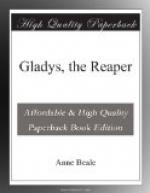She left the church, resolved to make such amends as were in her power, for the hasty and haughty way of her rejection of Rowland, and to strive to be less proud for the future.
When she was without, her father said to her, that he must go into the vicarage to congratulate the vicar on his nephew’s preaching, and to ask Rowland to dinner. Miss Gwynne endeavoured to dissuade him from doing so, but Lady Mary Nugent expressed her intention of performing similar civilities; consequently the whole party, Colonel Vaughan and Miss Hall inclusive, walked across the churchyard to the vicarage, which lay just the other side of it.
The vicarage was a snug little cottage, with a rustic porch, adorned with the Virginian creeper, which, together with the massive ivy, also nearly covered the house. Red and cheerful looked the tiny dwelling beneath the autumn sun; and very pretty was the garden which surrounded it, still bright with dahlias, fuchsias, red geraniums, and monthly roses. It was here, years ago, that Rowland, Miss Gwynne, and Netta had often played together; and it was here that Rowland had passed the principal part of his holidays when at home from Rugby or college. It was here that Mrs Jonathan had done her utmost to make a gentleman of him, and had succeeded to her heart’s content. Rowland had been very happy with his uncle and aunt, and loved them almost as well as his parents.
In the pretty garden were innumerable wonderful stones heaped into all sorts of masses, which he had helped his uncle to bring from various parts in the neighbourhood, and all of which were curiosities in their way; and there, also, was a fernery which he himself had made, and which contained all the remarkable ferns of a country rich in those beautiful productions of nature. The vicarage and its garden were neatness itself. Mrs Jonathan prided herself on them, and took great pains to prove that there could be, in a Welsh country village, a clergyman’s abode something akin to the far-famed dwellings of the English ecclesiastic.
The party from the church quite filled the little drawing-room. Mr Jonathan Prothero was in an easy-chair, with his foot on a cushion, and looking very much like a caged stork.
Every one began by congratulating him on the success of his nephew in the pulpit.
‘He must become a popular preacher,’ said Lady Mary Nugent.
‘I must say I have seldom heard more simple yet forcible language,’ said Mr Gwynne.
‘He touched us all upon our besetting sin of pride,’ said Colonel Vaughan, glancing at Miss Gwynne, who said nothing.
‘And thuch a beautiful voice!’ remarked Miss Nugent.
Mrs Jonathan looked delighted.
‘But where is he all this time, my dear?’ asked the vicar.
We must answer the question by informing the reader that, having watched his congregation leave the church, he went into the vestry and sat down there, in order to avoid meeting any of the Gwynne party; when a messenger from his aunt came to inform him that he was wanted at once. He inquired by whom, and on hearing, tried to arm himself for an unavoidable encounter with Miss Gwynne.




